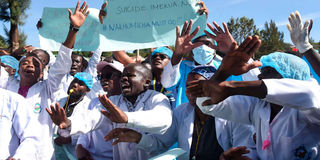Prime
Kenyan patients turn to Tanzania for treatment amid doctors' strike at home

Kenya Medical Practitioners, Pharmacists, and Dentists Union (KMPDU) officials demonstrate in Eldoret town streets, Uasin Gishu County, Kenya, on March 21, 2024. PHOTO | NMG
What you need to know:
- An investigation by The Citizen has revealed an increase in patients from Kenya at hospitals near the Kenya-Tanzania border in Rombo district, Kilimanjaro region, and Longido district in Arusha region.
Arusha. Kenyan citizens seeking medical treatment have begun entering Tanzania due to the ongoing strike by doctors and clinical officers in public hospitals in Kenya.
An investigation by The Citizen has revealed an increase in patients from Kenya at hospitals near the Kenya-Tanzania border in Rombo district, Kilimanjaro region, and Longido district in Arusha region.
As the situation in these two district hospitals persists, Mara region authorities have said they are closely monitoring patients crossing the border in search of medical treatment.
Doctors in public hospitals in Kenya went on strike on March 15, 2024, involving members of the Kenya Medical Practitioners, Pharmacists, and Dentists Union (KMPDU), which has about 7,000 members.
The doctors demand payment of salary arrears, employment of contract doctors, and delays in salary payment among others.
The strike, now entering its third week, has been reinforced by clinical officers who have joined the strike, disrupting medical services in public hospitals across the country.
This is the second strike after the one in 2016/2017, which lasted for 100 days, alongside a nurses' strike involving 45,000 nurses nationwide and medical officers, which lasted for 20 days.
In 2017, Kenyan citizens also sought service in Tanzania, including a woman identified as Bahati Tabu, 37, who gave birth to quintuplets at the Faraja Hospital in Himo district, Kilimanjaro region.
The strike, involving over 5,000 doctors and nurses from government hospitals began on December 6, 2016, and it was reported that more than 40 patients lost their lives, prompting Bahati to flee to Tanzania for delivery.
The current situation in Kilimanjaro
An investigation carried out by The Citizen at several healthcare facilities, including Ngoyoni Hospital in Rombo district, has revealed the presence of patients from Kenya who are receiving treatment at the hospital.
Some patients from Loitokitok in Kenya said they decided to seek treatment in Tanzania due to the ongoing strike in their country.
A parent who preferred not to be named said she used a motorcycle taxi from Kenya to save her child's life because private hospitals in Kenya are expensive.
"We came here because there is a doctor strike in our country, and since Tanzania is our neighbour, we decided to come here to save the lives of our loved ones. It's a long distance; I spent more than Ksh15,000 shillings on a motorcycle taxi to get here," she said.
The Kenyan citizen added: "Despite the high cost of transportation to get here, my child has only received first aid, after which we have been referred to KCMC Hospital for further treatment."
A doctor at the hospital, who preferred anonymity confirmed the presence of patients from the neighbouring country. He, however, said that their number is not as large as that of patients received during the 2016–2017 strike.
"There are patients from Kenya, but they are not as many as those received during the previous strike. During that time, patients flooded this hospital, and some were even brought by buses for treatment here, which made us work day and night," the anonymous doctor said.
Speaking about the increase in patients from Kenya, the Chief Medical Officer of Rombo District, Deogratius Maruba, said that some hospitals have seen an increase in the number of patients compared to those received before the strike.
"There has been an increase in patients from Kenya at some centres, especially at Ngoyoni Hospital," said the medical officer.
The Chief Medical Officer of Kilimanjaro region, Jairy Khanga, acknowledged the increase in patients at border healthcare facilities, especially in Rombo district, saying that the increase is mostly among pregnant women and children.
"There is indeed a significant increase, according to information from the Rombo District Council. There are many pregnant women and children from Kenya in our hospitals and healthcare facilities, but this increase has not affected service delivery here.
This increase necessitates the need to charge them for the services that locals don’t pay for here, according to Dr Khanga.
"Without this, the resources allocated for our people will not be enough. Costs that are not charged to Tanzanians, including pregnant women and children under five, will be charged to these colleagues," Dr Khanga emphasised.
"But we also want to cooperate with immigration authorities to ensure that these people enter the country through the right channels."
However, an investigation conducted by The Citizen in Horohoro, Tanga region, found no signs of patients entering the country.
The situation in Longido
As in Rombo district in Kilimanjaro region, the acting head of the Department of Health, Community Welfare, and Nutrition in Longido District, Dr Mathew Majani, said that the number of patients from Kenya seeking treatment at Orendeke Health Centre has increased.
The Namanga area in Longido district is the border between Tanzania and Kenya, where, according to the acting head, despite the lack of accurate statistics, the number of patients from Kenya seeking healthcare services at Orendeke Health Centre has increased since the strike began in March 2024.
"Considering that this is a border area, according to the information I have, the number of patients from Kenya coming to receive healthcare services, especially at Orendeke Health Centre, has increased," said Dr Majani.
The District Commissioner of Longido, Marko Ng'umbi, said that people from the area, both Kenyan and Tanzanian citizens, interact.
He said that Kenyan citizens come to Tanzania for various services, and Tanzanian citizens go to Kenya for the same.
"Truly, after the doctors' and nurses' strike in Kenya, we have not checked if there has been an increase in patients; I think we will now start to monitor and assess that to determine if there has been an increase or not," he said.
Mara region on standby
As the doctors and nurses strike in Kenya continues, Mara region authorities said they are ready to monitor patients crossing the border into the region to receive medical treatment.
This was stated by the Chief Medical Officer of the Tarime Rural District Council, Joseph Mziba, indicating that supervisors of health centres located at the border have been given guidelines on steps to take if they receive patients from Kenya.
"No health centre has so far reported an increase in patients, especially from Kenya. I believe these patients have been absorbed by private health facilities," said Dr Mziba in an interview.
He said that the interaction of communities living around the border is one of the primary reasons that need more attention and close monitoring, promising to provide information once it is discovered that patients from Kenya have entered the country seeking treatment.
"We have instructed them to notify us in case there’s an increase in patients," said Dr Mziba.



